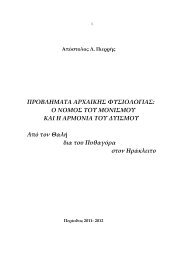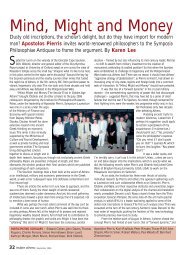chapter 10 the monism of darkness and the dualism of limit and ...
chapter 10 the monism of darkness and the dualism of limit and ...
chapter 10 the monism of darkness and the dualism of limit and ...
You also want an ePaper? Increase the reach of your titles
YUMPU automatically turns print PDFs into web optimized ePapers that Google loves.
96 CHAPTER <strong>10</strong><br />
The Scholiast rightly interprets: Nox; confusionem rerum dicit<br />
noctem, mixtura luci tenebras, inferos coelo.<br />
Recession to primordial Chaos when Time reaches its end is<br />
similarly described in <strong>the</strong> same work, I, 72-80:<br />
sic, cum compage soluta<br />
saecula tota mundi suprema coegerit hora,<br />
antiquum repetent iterum Chaos omnia, mixtis<br />
sidera sideribus concurrent, ignea pontum<br />
Plaustra 52 petent, tellus extendere litera nolet<br />
excutietque fretum, fratri contraria Phoebe<br />
ibit et obliquum bigas agitare per orbem<br />
indignata diem poscet sibi, totaque discors<br />
machina divolsi turbabit foedera mundi.<br />
Chaos strives to achieve restitution <strong>of</strong> primordial confusion:<br />
VI, 696: Chaos, innumeros avidum confundere mundos.<br />
Opposite Typhonic winds <strong>and</strong> a Titanic turbulence <strong>of</strong> <strong>the</strong> Aquatic<br />
element in Ocean <strong>and</strong> Sea constitute <strong>the</strong> character <strong>of</strong> <strong>the</strong> imminent<br />
fusion <strong>of</strong> sea <strong>and</strong> sky, <strong>the</strong> Old One <strong>of</strong> Confusion being ever new <strong>and</strong><br />
<strong>the</strong> Last <strong>of</strong> <strong>the</strong> Future, primordial Chaos. Seneca, Agamemnon 490-<br />
511.<br />
506 Mundum revelli sedibus totum suis,<br />
ipsosque rupto crederes coelo deos<br />
decidere, et atrum rebus induci chaos.<br />
Cf. Thyestes 829-834 Peiper et Richter. Things originate in Chaos<br />
<strong>and</strong> come back to Chaos (v. Octavia 402; Hercules Oeteus 1138).<br />
Chaos is <strong>of</strong> <strong>the</strong> eternal Night (Hercules Furens 614; Medea 9). At <strong>the</strong><br />
bottom <strong>of</strong> <strong>the</strong> Universe lie <strong>the</strong> Palaces <strong>of</strong> Hades; below it yawns <strong>the</strong><br />
bottomless abyss <strong>of</strong> Chaos ready to swallow <strong>the</strong> World when weariness<br />
overcomes it at <strong>the</strong> end <strong>of</strong> Time, <strong>the</strong> orbiting (universal revolution)<br />
that retains <strong>the</strong> cosmic elements <strong>and</strong> parts in separation fails <strong>and</strong><br />
matter becomes heavy, drives back things into <strong>the</strong> original<br />
indiscriminate confusion, as in <strong>the</strong> Empedoclean collapse <strong>of</strong> <strong>the</strong><br />
World into <strong>the</strong> Ê·ÖÚÔ˜. Valerius Flaccus, Argonauticon I, 827 sqq.:










